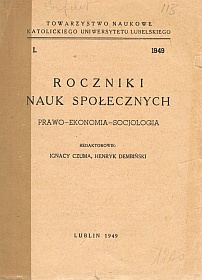Zewnętrzna i wewnętrzna istota posiadania w prawie polskim
Abstrakt
There exists a controversy in the science of civil law as to the essential elements of possession. The question is whether possession must be understood only as the actual power over a thing (corpus possessions), or is there besides the real element of possession another essential component, that is the element of will (animus possidendi).
The Roman lawyers attributed an essential meaning to the element of will. The French science in general has the same point of view as far as the French law is concerned. In the systems of civil law which were in force in Poland till the 1st January 1947, only the Austrian civil code required the will of possession. In the German civil code, however, the whole institution of possession is looked upon from the point of view of actual power without any element of will.
The new Polish real law looks upon the institution of possession as the actual power over a thing. When things are objects of possession, this power is very much the same as the owner's, if however, rights are such objects, this power is the same that we find in other subjective laws.
Although the Polish law does not demand clearly the element of will for the construction of possession, this element, however, together with the element of power has to be counted among the essential components of possession. This results from the comparison of different norms referring to possession with norms referring to the state of detaining (detentio). The element of will is based on the intention of realising the rights which result from the state of actual power.
Copyright (c) 1949 Roczniki Nauk Społecznych

Utwór dostępny jest na licencji Creative Commons Uznanie autorstwa – Użycie niekomercyjne – Bez utworów zależnych 4.0 Międzynarodowe.


